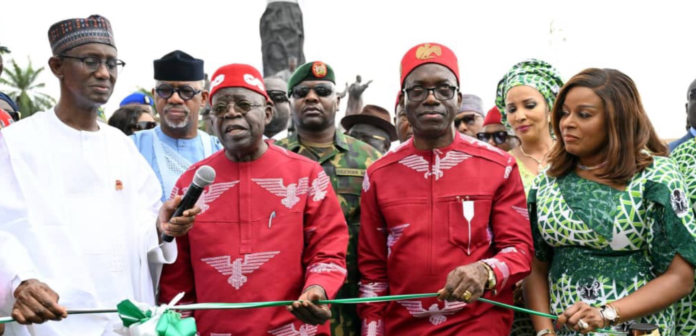Background: Tinubu’s Visit to Anambra
President Bola Tinubu’s visit to Anambra State on May 8, 2025, was marked by the commissioning of several projects initiated by Governor Chukwuma Soludo’s administration. Among the notable projects were the new Government House, the Solution Fun City amusement park, and the Emeka Anyaoku Institute for International Studies and Diplomacy at Nnamdi Azikiwe University. The visit was seen as a significant event, drawing attention both locally and nationally.
Governor Soludo played a pivotal role in orchestrating the visit, inviting President Tinubu and ensuring the successful execution of the events. The Governor’s speech during the commissioning ceremonies was described as “Maradonic,” a term used to convey the emotional and theatrical delivery of his remarks. He lauded President Tinubu’s economic policies and pledged support for his administration, even suggesting that he would back the President until 2031.
While the visit showcased infrastructure development in Anambra, it also set the stage for political debates and criticisms that would follow.
Criticisms of Governor Soludo
Despite the celebratory atmosphere surrounding President Tinubu’s visit, Governor Soludo faced significant criticism from various quarters. One of the most vocal critics was Valentine Ozigbo, a former CEO and 2025 governorship contender. Ozigbo described Soludo’s administration as a “glaring theatre of missed priorities, misplaced ambitions, and media optics masquerading as progress.”
Ozigbo’s critique centered on the perceived misallocation of resources. He questioned the relevance of projects like the Solution Fun City amusement park, suggesting that such ventures were more about political optics than addressing pressing public needs. He further criticized the administration for failing to deliver on essential services, highlighting the lack of public housing, stagnant investment inflows, and the absence of structural economic transformation in Anambra.
Additionally, Soludo’s claim that the last presidential visit to Anambra was in 2012, solely to commission a brewery, was challenged by Dr. Josef Onoh, a former campaign spokesman for President Tinubu in the Southeast. Onoh pointed out that both Presidents Goodluck Jonathan and Muhammadu Buhari had visited Anambra during their tenures, commissioning various projects, thus refuting Soludo’s assertion.
These criticisms painted a picture of an administration more focused on political theater than on addressing the real needs of the people.
Governance Ethics and Regional Equity
The events surrounding President Tinubu’s visit to Anambra raise pertinent questions about governance ethics and regional equity. Ethical governance entails making decisions that prioritize the well-being of the populace, ensuring transparency, accountability, and the judicious use of public resources.
Critics argue that Governor Soludo’s actions during the visit reflected a prioritization of political gain over ethical governance. The commissioning of projects with limited immediate impact on the populace, such as the amusement park, while neglecting pressing issues like housing and unemployment, suggests a governance approach more attuned to political optics than to the equitable development of the region.
Furthermore, the timing of the visit, coinciding with the lead-up to the 2025 governorship election, has been perceived by some as an attempt to secure political advantage through state resources. This raises concerns about the ethical implications of using public office for personal or political gain, undermining public trust in governance institutions.
From a regional equity perspective, the focus on high-profile projects in the state capital, Awka, may exacerbate existing disparities within Anambra. Residents in rural areas and other underserved regions may feel marginalized if development efforts are concentrated in specific locales, leading to feelings of neglect and disenfranchisement.
In this context, ethical governance should encompass a commitment to regional equity, ensuring that development benefits are distributed fairly across all segments of society, addressing the needs of the most vulnerable, and fostering inclusive growth.
Public and Political Reactions
The public and political reactions to President Tinubu’s visit and Governor Soludo’s role in it have been mixed. While some segments of the population viewed the visit as a positive development, others expressed skepticism and concern.
The Human Rights Writers Association of Nigeria (HURIWA) criticized both Governor Soludo and Enugu State Governor Peter Mbah for hosting elaborate receptions for President Tinubu while remaining silent on the continued detention of Nnamdi Kanu, leader of the Indigenous People of Biafra (IPOB). HURIWA described the ceremonies as politically motivated and insensitive, accusing the governors of ignoring key issues affecting the Southeast, particularly insecurity and concerns of marginalization.
Similarly, the African Action Congress (AAC) condemned the visit, labeling the projects commissioned as “frivolous” amid rising insecurity and hunger in the state. The party accused Governor Soludo of aligning with a federal government that has failed the Nigerian people and criticized the timing of the visit as politically motivated, suggesting it could influence the upcoming 2025 gubernatorial elections.
These reactions underscore the contentious nature of the visit and highlight the broader concerns about governance priorities and the ethical use of political power.
The events surrounding President Tinubu’s visit to Anambra State and the subsequent criticisms of Governor Chukwuma Soludo underscore the complex interplay between governance, ethics, and regional equity. While infrastructure development is crucial, it must be balanced with the ethical responsibility to address the pressing needs of the populace and ensure equitable distribution of resources.
As Anambra approaches its 2025 governorship election, the discourse on governance ethics and regional equity remains central to public and political conversations. The electorate faces the challenge of discerning between political performance and genuine service, between symbolic gestures and substantive development. In this context, ethical governance and a commitment to regional equity should be paramount considerations for those seeking public office.


